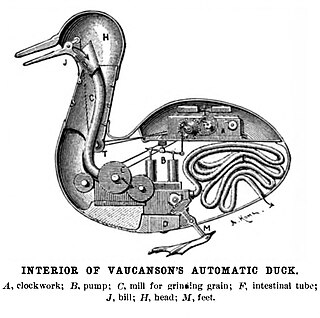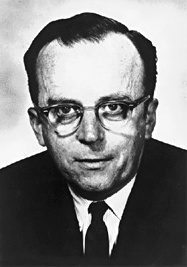Systems theory is the transdisciplinary study of systems, i.e. cohesive groups of interrelated, interdependent components that can be natural or artificial. Every system has causal boundaries, is influenced by its context, defined by its structure, function and role, and expressed through its relations with other systems. A system is "more than the sum of its parts" when it expresses synergy or emergent behavior.

In philosophy, systems theory, science, and art, emergence occurs when a complex entity has properties or behaviors that its parts do not have on their own, and emerge only when they interact in a wider whole.

Reductionism is any of several related philosophical ideas regarding the associations between phenomena which can be described in terms of simpler or more fundamental phenomena. It is also described as an intellectual and philosophical position that interprets a complex system as the sum of its parts.

An organization or organisation, is an entity—such as a company, or corporation or an institution, or an association—comprising one or more people and having a particular purpose.

Joseph Carl Robnett Licklider, known simply as J. C. R. or "Lick", was an American psychologist and computer scientist who is considered to be among the most prominent figures in computer science development and general computing history.

Self-organization, also called spontaneous order in the social sciences, is a process where some form of overall order arises from local interactions between parts of an initially disordered system. The process can be spontaneous when sufficient energy is available, not needing control by any external agent. It is often triggered by seemingly random fluctuations, amplified by positive feedback. The resulting organization is wholly decentralized, distributed over all the components of the system. As such, the organization is typically robust and able to survive or self-repair substantial perturbation. Chaos theory discusses self-organization in terms of islands of predictability in a sea of chaotic unpredictability.

Emergentism is the belief in emergence, particularly as it involves consciousness and the philosophy of mind. A property of a system is said to be emergent if it is a new outcome of some other properties of the system and their interaction, while it is itself different from them. Within the philosophy of science, emergentism is analyzed both as it contrasts with and parallels reductionism. This philosophical theory suggests that higher-level properties and phenomena arise from the interactions and organization of lower-level entities yet are not reducible to these simpler components. It emphasizes the idea that the whole is more than the sum of its parts.

Genre studies is an academic subject which studies genre theory as a branch of general critical theory in several different fields, including art, literature, linguistics, rhetoric and composition studies.
Theories of technological change and innovation attempt to explain the factors that shape technological innovation as well as the impact of technology on society and culture. Some of the most contemporary theories of technological change reject two of the previous views: the linear model of technological innovation and other, the technological determinism. To challenge the linear model, some of today's theories of technological change and innovation point to the history of technology, where they find evidence that technological innovation often gives rise to new scientific fields, and emphasizes the important role that social networks and cultural values play in creating and shaping technological artifacts. To challenge the so-called "technological determinism", today's theories of technological change emphasize the scope of the need of technical choice, which they find to be greater than most laypeople can realize; as scientists in philosophy of science, and further science and technology often like to say about this "It could have been different." For this reason, theorists who take these positions often argue that a greater public involvement in technological decision-making is desired.
The New Thought movement is a new religious movement that coalesced in the United States in the early 19th century. New Thought was seen by its adherents as succeeding "ancient thought", accumulated wisdom and philosophy from a variety of origins, such as Ancient Greek, Roman, Egyptian, Chinese, Taoist, Hindu, and Buddhist cultures and their related belief systems, primarily regarding the interaction among thought, belief, consciousness in the human mind, and the effects of these within and beyond the human mind. Though no direct line of transmission is traceable, many adherents to New Thought in the 19th and 20th centuries claimed to be direct descendants of those systems.

Biological organisation is the organisation of complex biological structures and systems that define life using a reductionistic approach. The traditional hierarchy, as detailed below, extends from atoms to biospheres. The higher levels of this scheme are often referred to as an ecological organisation concept, or as the field, hierarchical ecology.
François Cooren is a French and Canadian communication scholar and was, from 2005 to 2008, the editor of Communication Theory. He completed his Ph.D. at the Department of communication of the Université de Montréal in 1996, under the supervision of James R. Taylor. He was chairman of that same department from 2006 to 2015, where he is full professor. Cooren also completed a postdoc at the Université de Louvain-la-Neuve, in Belgium.
James Renwick Taylor, sometimes known as Jim Taylor, was a Canadian academic and Professor Emeritus at the Department of Communication of the Université de Montréal, which he founded with Annie Méar and André H. Caron Ed.D in the early 1970s.

The global brain is a neuroscience-inspired and futurological vision of the planetary information and communications technology network that interconnects all humans and their technological artifacts. As this network stores ever more information, takes over ever more functions of coordination and communication from traditional organizations, and becomes increasingly intelligent, it increasingly plays the role of a brain for the planet Earth. In the philosophy of mind, global brain finds an analog in Averroes's theory of the unity of the intellect.
Business agility refers to rapid, continuous, and systematic evolutionary adaptation and entrepreneurial innovation directed at gaining and maintaining competitive advantage. Business agility can be sustained by maintaining and adapting the goods and services offered to meet with customer demands, adjusting to the marketplace changes in a business environment, and taking advantage of available human resources.

Information is an abstract concept that refers to something which has the power to inform. At the most fundamental level, it pertains to the interpretation of that which may be sensed, or their abstractions. Any natural process that is not completely random and any observable pattern in any medium can be said to convey some amount of information. Whereas digital signals and other data use discrete signs to convey information, other phenomena and artifacts such as analogue signals, poems, pictures, music or other sounds, and currents convey information in a more continuous form. Information is not knowledge itself, but the meaning that may be derived from a representation through interpretation.
The communicative constitution of organizations (CCO) perspective is broadly characterized by the claim that communication is not something that happens within organizations or between organizational members; instead, communication is the process whereby organizations are constituted. Specifically, this view contends: “organization is an effect of communication not its predecessor." This perspective is part of a broader constitutive view of communication arguing, "elements of communication, rather than being fixed in advance, are reflexively constituted within the act of communication itself".
Demand articulation is a concept developed within the scientific field of innovation studies which serves to explain learning processes about needs for new and emerging technologies. Emerging technologies are technologies in their early phase of development, which have not resulted in concrete products yet. Many characteristics of these technologies, such as the technological aspects but also the needs of users concerning the technology, have not been specified yet. Demand articulation can be defined as ‘iterative, inherently creative processes in which stakeholders try to address what they perceive as important characteristics of and attempt to unravel preferences for an emerging innovation’.
Organizational Information Theory (OIT) is a communication theory, developed by Karl Weick, offering systemic insight into the processing and exchange of information within organizations and among its members. Unlike the past structure-centered theory, OIT focuses on the process of organizing in dynamic, information-rich environments. Given that, it contends that the main activity of organizations is the process of making sense of equivocal information. Organizational members are instrumental to reduce equivocality and achieve sensemaking through some strategies — enactment, selection, and retention of information. With a framework that is interdisciplinary in nature, organizational information theory's desire to eliminate both ambiguity and complexity from workplace messaging builds upon earlier findings from general systems theory and phenomenology.
Text and conversation is a theory in the field of organizational communication illustrating how communication makes up an organization. In the theory's simplest explanation, an organization is created and defined by communication. Communication "is" the organization and the organization exists because communication takes place. The theory is built on the notion, an organization is not seen as a physical unit holding communication. Text and conversation theory puts communication processes at the heart of organizational communication and postulates, an organization doesn't contain communication as a "causal influence", but is formed by the communication within. This theory is not intended for direct application, but rather to explain how communication exists. The theory provides a framework for better understanding organizational communication.








